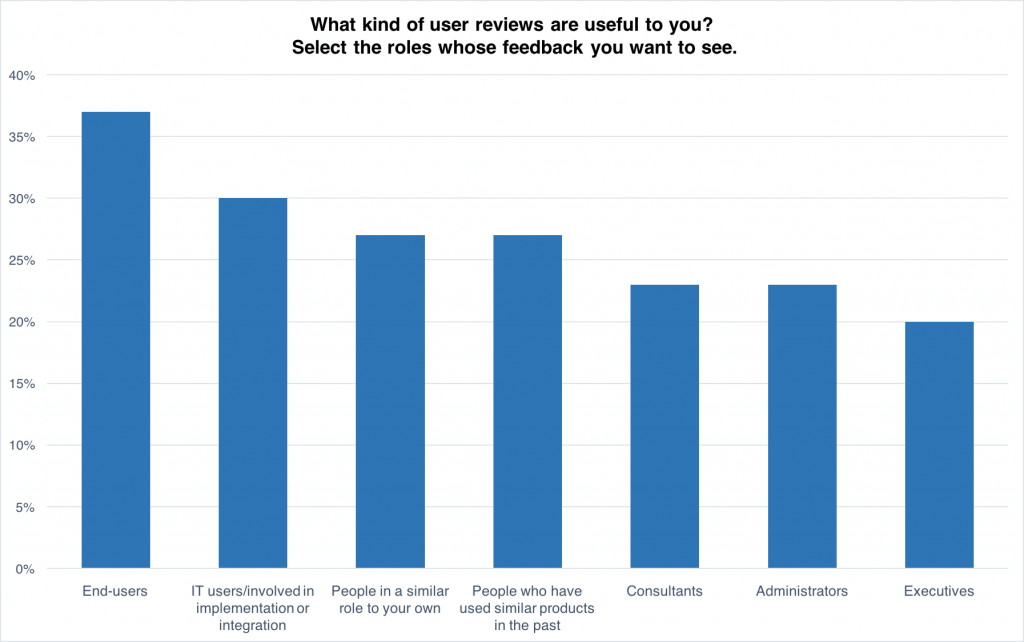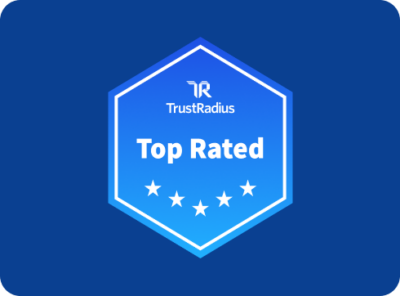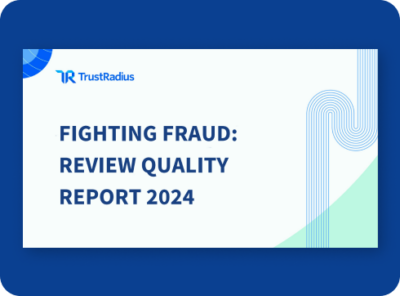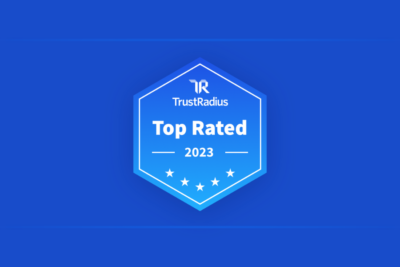
Executives vs. End-Users: Who do your buyers want to hear from?
If you’re thinking about a review program, you probably know that your buyers would rather hear from your customers — the people actually using your product — than your marketing team or your sales reps. The next question to ask yourself is, which customers should you ask to share feedback?
Many vendors believe that reviews from executives are the most important, and want to focus their outreach on that segment. The impulse behind this executive mindset is understandable. Some think that the more impressive a reviewer’s title, the more influence their review will have on purchasing decisions. Others believe that because the economic buyer of B2B technology is often an executive, decision makers are only interested in hearing from other VPs and C-levels.
But both of these reasons are based on a misconception about who buyers trust to give product feedback, as well as what kind of information they’re looking for before they purchase. We recently polled buyers on TrustRadius.com about which roles they’d like to see reviews from. The data tells us that:
- Buyers want multiple points of view on each product. In fact, they are often looking at reviews precisely because they offer perspectives from a variety a of roles, which can be difficult to find elsewhere.
- The most commonly sought out perspectives are from end-users. Even executives point out that end-user insights are critical as they consider and compare products.
 Source: June 2017 poll of 450 buyers using TrustRadius.com
Source: June 2017 poll of 450 buyers using TrustRadius.com
Buyers are looking for a range of perspectives
No single role took the lion’s share of votes in our survey. Rather, the responses were pretty evenly spread across all the categories, suggesting that what’s most useful to buyers is a range of viewpoints from different roles. On average, buyers selected 1.87 roles they’d like to see feedback from, and some selected all seven options. One buyer said that reviews from other role, even beyond these seven, are “helpful as well.” Another said, “I am open to all reviews.”
Reviewer role diversity can increase buyer confidence in the data, shed light on the different stakeholders that will be impacted by the product, and give buyers the ability to gauge how much of the sentiment is role-specific.
“[I want] to see other stakeholders’ opinions in regards to the product.”
“I was trying to really dig down in terms of… ‘personas’ – who are the different types of people who are using this, and how many different personas do we have? That’s really helpful.”
“Usually you only think about your role with the product, and you can get a jaded view or protectionist view.”
Executive buyers want reviews from many perspectives as well, as Forcepoint’s CIO Meerah Rajavel recently told us:
“Sometimes vendor claims make a product sound very grandiose and promising, but it often comes down to execution and how well a product solved a business problem in practice. I want to see a 360-degree view of the product from many different perspectives—from a technical executive, to an engineer, to a middle manager, to a business person tasked with solving a specific problem.”
Buyers trust end-user insights and are less interested in executive reviews
Though buyers want multiple perspectives, end-users are the most frequently sought-after role. About 37% of buyers who took our poll want to see reviews from end-users specifically. At the other end of the spectrum, executives received the least votes at just over 20%.
Undeniably, executives are “senior and well respected,” and buyers said their perspectives can be useful when “looking for a macro view of products we’re considering.” But executive reviews don’t usually provide an “operations – end user experience” view, which buyers need to feel informed enough to commit to a purchase. Buyers trust end-users to provide very honest, straightforward feedback about usability, since it aligns with their own interests, and they have fewer competing priorities.
“[End-users] are the ones really using the tools, no management bias.”
“Only interested in views of people who personally have technical experience — not interested in executives or people who do not use software personally.”
“There is no better reference for a product than someone who uses it day in and day out.”
“[I] am specifically seeking to understand how challenging it will be for me to learn and use.”
Next to end-users, buyers identified IT users and/or users involved in implementation and integration as particularly valuable reviewers. Indeed, implementation and integration commonly come up in our conversations with buyers as topics they seek feedback on.
There is special value in reviews from “people like you”
Reading reviews from different roles provides a robust, multi-faceted understanding of how the product might work for the organization as a whole. But buyers are also interested in how the product will affect them specifically. Because buyers believe reviewers who are are in a similar role probably “think alike,” their feedback helps buyers understand what their own personal experience with the product will be.
In addition to looking for people in similar roles, buyers look for reviews from similar industries and company sizes.
“[I want feedback from people in a similar role to my own because they] typically have the same responsibilities and requirements, and a good understanding of the position’s needs and challenges.”
“I’m a small business owner that would like to see reviews by other small business owners.”
“The administrators know how to use the system completely and someone who is in the same role can give you little tips.”
“Especially users that work in same industry as we do and are confronted with the same type of business problems requiring leading edge software solutions.”
Your best bet is to include a variety of roles and perspectives in your review strategy
Buyers are clear about what they’re looking for—unfiltered feedback about your product from a range of perspectives representing a full spectrum of sentiment. How can you ensure your buyers have what they need to purchase your product with confidence?
First and foremost, invite a broad sample of customers to review your product on TrustRadius. Try to get reviews from experienced end-users, administrators, and technical implementers, as well as high-level executives who can speak to business impact. TrustRadius allows buyers to filter reviews by role with the product, as well as title and department with the company, ensuring that buyers can find the reviews most relevant to them.
Additionally, when you surface customer feedback in your own channels, whether it’s reviews or testimonials and customer evidence you produce yourself, keep in mind that buyers are interested in a variety of perspectives. You may want to create targeted landing pages for each of your buyer personas, proactively surfacing feedback from the most sought-after roles. The goal is to help each buyer find “people like me” while still getting a full view of your product.
Want to learn how TrustRadius can help you get high-quality reviews from the right users? Request a demo today.




